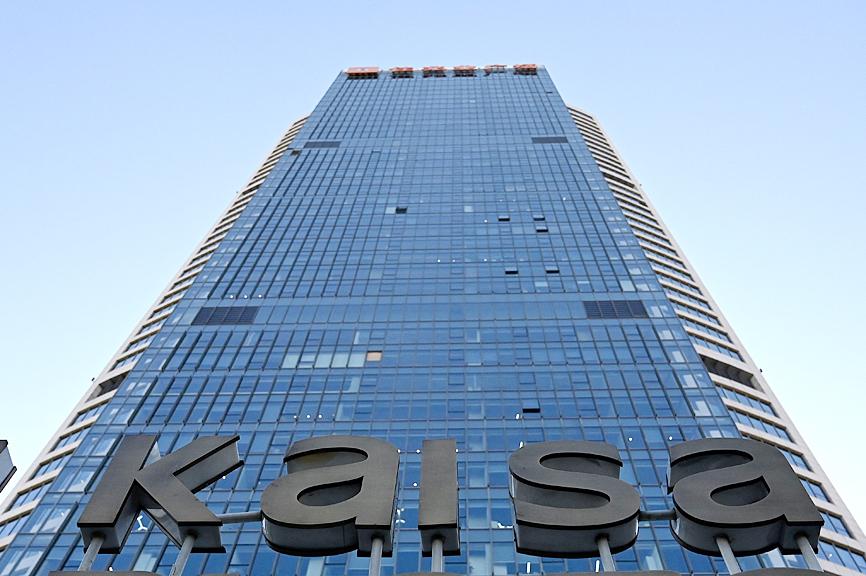Chinese property firm Kaisa Group Holdings Ltd (佳兆業集團) yesterday suspended share trading in Hong Kong as questions swirl over its ability to make repayments and contagion spreads within the nation’s debt-ridden real-estate sector.
Kaisa, China’s 27th-largest real-estate firm in terms of sales, but one of its most indebted, became the latest company to spook investors when it announced on Friday that it had failed in a bid for a debt swap that would buy it crucial time.
Yesterday morning the firm announced that it was suspending trading in Hong Kong, where it is listed, “pending the release by the company of an announcement containing inside information.”

Photo: AFP
It is the second time the company has suspended trading in the past month.
Kaisa last month announced a plan to delay the repayment timeline for some of its bonds, offering an exchange for at least US$380 million of notes, which would have given it some room to find money further down the line.
However, the offer failed to win the 95 percent approval from bondholders needed for the plan to go ahead.
The company currently has about US$11.6 billion of US dollar notes outstanding.
It had defaulted on a US dollar debt in 2015, becoming the first Chinese developer to do so.
The most indebted Chinese property firm is China Evergrande Group (恆大集團), which set off the current confidence crisis earlier in the summer.
The Shenzhen-based behemoth racked up an eye-watering US$300 billion in loans before Beijing began to rein in the sector.
On Tuesday, Evergrande missed a deadline to repay some of its overseas creditors, raising the prospect of it defaulting as it prepares for a government-backed mega-restructure.
Bloomberg News reported some of the US$82.5 million in overdue coupon payments it owed by the end of Tuesday — when a 30-day grace period ran out — remained unpaid.
Ratings group S&P has predicted that a default by Evergrande is now “inevitable.”
Kaisa and Evergrande have become the most visible faces of the debt crunch within China’s property sector, but defaults have rippled throughout the sector.
Bloomberg News reported that at least 10 lower-rated real-estate firms have now defaulted on onshore or offshore bonds since the summer.
Chinese borrowers have so far this year defaulted on a record US$10.2 billion of offshore bonds, with real-estate companies accounting for 36 percent of those non-repayments, Bloomberg reported.
Wealthy owners of at least seven Chinese real-estate companies have also sold off some of their own luxury assets in the past few weeks to help prop up their firms, Bloomberg added.

South Korea’s equity benchmark yesterday crossed a new milestone just a month after surpassing the once-unthinkable 5,000 mark as surging global memory demand powers the country’s biggest chipmakers. The KOSPI advanced as much as 2.6 percent to a record 6,123, with Samsung Electronics Co and SK Hynix Inc each gaining more than 2 percent. With the benchmark now up 45 percent this year, South Korea’s stock market capitalization has also moved past France’s, following last month’s overtaking of Germany’s. Long overlooked by foreign funds, despite being undervalued, South Korean stocks have now emerged as clear winners in the global market. The so-called “artificial intelligence

‘SEISMIC SHIFT’: The researcher forecast there would be about 1.1 billion mobile shipments this year, down from 1.26 billion the prior year and erasing years of gains The global smartphone market is expected to contract 12.9 percent this year due to the unprecedented memorychip shortage, marking “a crisis like no other,” researcher International Data Corp (IDC) said. The new forecast, a dramatic revision down from earlier estimates, gives the latest accounting of the ongoing memory crunch that is affecting every corner of the electronics industry. The demand for advanced memory to power artificial intelligence (AI) tasks has drained global supply until well into next year and jeopardizes the business model of many smartphone makers. IDC forecast about 1.1 billion mobile shipments this year, down from 1.26 billion the prior

People stand in a Pokemon store in Tokyo on Thursday. One of the world highest-grossing franchises is celebrated its 30th anniversary yesterday.

Chinese artificial intelligence (AI) start-up DeepSeek’s (深度求索) latest AI model, set to be released as soon as next week, was trained on Nvidia Corp’s most advanced AI chip, the Blackwell, a senior official of US President Donald Trump’s administration said on Monday, in what could represent a violation of US export controls. The US believes DeepSeek will remove the technical indicators that might reveal its use of American AI chips, the official said, adding that the Blackwells are likely clustered at its data center in Inner Mongolia, an autonomous region of China. The person declined to say how the US government received